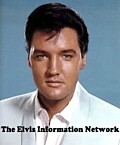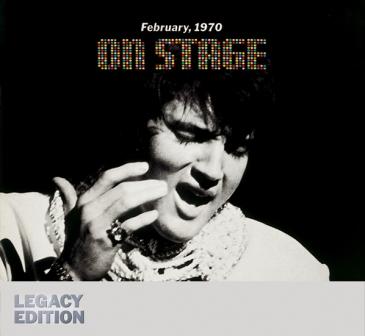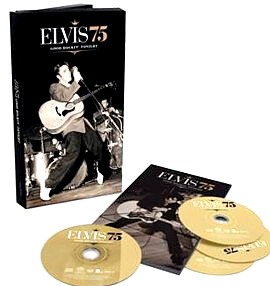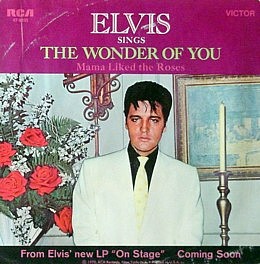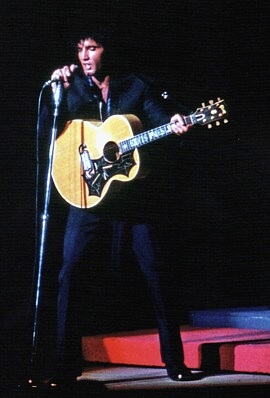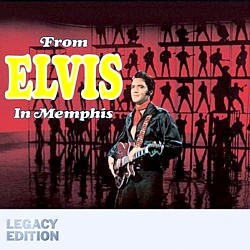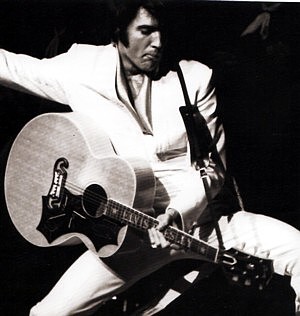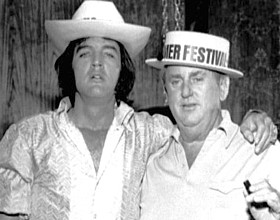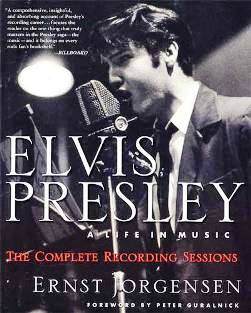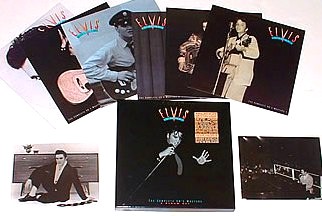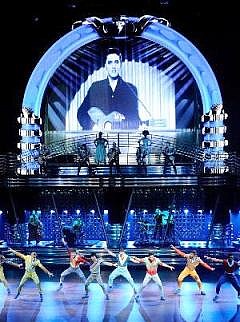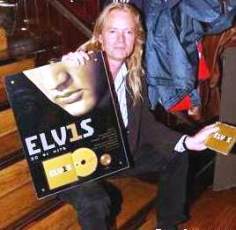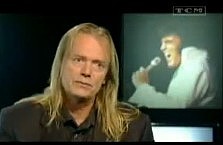 |
 |

SEE BELOW FOR A LIST OF OTHER EIN INTERVIEWS WITH ERNST JORGENSEN Reissue, Repackage, Repackage: Producer Ernst Jorgensen on Burnishing Elvis’ Musical Legacy Back in 1987 the King of Rock ’n’ Roll’s recorded legacy lay in shambles. A decade of haphazard (and occasionally offensive) posthumous anthologies had been piled atop a previous decade of cheapie compilations, most designed to milk the last farthing out of rock’s most prodigious (if maddeningly inconsistent) catalog. As the CD era blossomed, Presley-curious music shoppers of the mid-’80s were left to rummage through the LP racks in a soul-crushing, and often fruitless, search for an album that might provide both a clutch of good songs and something approaching value for money. Ernst Jorgensen changed all that. Already a student of Elvisiana by the time he was tasked by RCA with restoring the King’s musical heritage in the late ’80s, Jorgensen began serving up a treasure trove of reissues, compilations and re-contextualizations.
The newest is the 'On Stage: Legacy Edition', pairing two LPs that document the King’s return to the concert stage in Las Vegas in 1969 and 1970. Jon Cummings: Explain the thinking behind combining the In Person and On Stage albums for the new release. Was the goal to create a more complete historical document? Ernst J: We did the Legacy edition of the Memphis recording sessions [from the winter of 1969] last year, and we decided to follow it with the live material in order to give listeners a better impression of the scope of Elvis’ "comeback." These two albums tell two different stories about Elvis’ re-emergence as a live performer. In Person is very much like the Comeback Special — it’s like the shows that Elvis used to do in the ’50s, full of songs from that era — while On Stage is Elvis doing covers of songs by other people, many of which were contemporary at the time. Both the albums are important because they show the transition that was taking place at that point in time, when Elvis was getting comfortable with his new ambitions as a live performer. With On Stage, in particular, he took that new confidence and started to show the world that, not only through his own hits but also by his choice of other material, he was alive and well in the middle of the contemporary scene. Jon: I found it interesting that you chose to use the On Stage title rather than In Person, and that you placed On Stage on Disc One of the set, considering that it came second chronologically. I guess I had always considered In Person the more important set, historically speaking, because it had represented Elvis’ initial return to live performance.
There’s also the odd release history of the In Person album, which came out first as one-half of the two-record set From Memphis to Vegas/From Vegas to Memphis, and only later [after On Stage became a Top 10 album] was re-released by itself. In any case, they are equals in my mind as historical documents, and when you put them together as we’ve done you get a very complete look at Elvis’ live comeback. There were so many live Elvis albums between the Comeback Special and his death. Where do these recordings fit into that canon, in terms of quality and historical importance? Ernst J: If we’re talking about commercial history, the later concerts may in fact be more prominent. The sellout at Madison Square Garden, for four straight nights [in the summer of 1972], was certainly a very big deal at the time, and the Aloha from Hawaii television special was the first of its kind and was seen by more people than anything he had ever done. But from my point of view, for the way it marks the evolution of Elvis as an artist – the transition from that endless string of movies that it’s now politically correct to hate, to the Memphis recordings and then to the live comeback — this album is more important. I have this theory, which people might be able to shoot down, that in Elvis’ own mind and in terms of achieving his own goals he never felt more on top of his career than in the summer of 1970 when On Stage came out. Now he had full control of his persona and the music he was performing, he had his own band and he could sing gospel next to R&B next to rock. He liked having a full orchestra behind him — and it’s not a small thing that he was excited about the surprisingly high quality of the recordings that he could make on that stage in Vegas.
Elvis certainly looked and sounded great in the That’s the Way It Is film, which documents this same time period. Ernst J: Precisely. He’s lean, he sounds incredible, he’s wearing black karate outfits and looking as good as he ever did throughout his career. This comeback period was really a rejuvenation – much more like a new beginning than the beginning of the end. That’s one of the benefits for me of working on historic recordings like these – you can change people’s perception of what was going on at the time of the music’s original release.
That’s interesting to me, particularly in contrast with the Beatles’ remasters that were released to such celebration last fall. Part of the excitement came not only with the fact that the new CDs sounded far better than Capitol’s initial CD issues, but that the wholesale remastering made the tracks sound better than they ever had before, in any format. No similar desires with the Elvis material? Ernst J: You know, you could remix this material and make it sound more modern, but that’s not the aim of this Legacy series. Our goal is to get as close to the original sound as possible. At the end of the day, people are going to sit in their living rooms and play these CDs with a particular set of expectations, and we’ll have failed if we don’t provide them with an experience that closely approximates what the original experience of hearing these recordings was like.
I think what you see is that, with the Comeback Special and the Memphis sessions and the return to the concert stage, Elvis had achieved what he wanted to, and afterward there was a comedown. A lot of people had believed he wasn’t up to the challenge – and he was so nervous before the Comeback Special that it seemed he wasn’t sure he was up to it himself. That show, and the Memphis sessions as well, took him out of the comfort zone he had been establishing for years. Even after the concerts we document on the new album, there were a few moments when the Colonel managed to create a situation that required Elvis’ very best – whether it was Madison Square Garden or Aloha from Hawaii – and Elvis really seemed to rise to those occasions. But apart from those moments, you can find a lot of places where things started to not go so well. He did get bored later.
And the songs Elvis recorded right before he went into the army were an expansion on what he had been doing. They did a masterful job keeping Elvis’ music on the radio while he was gone, so you have to give the Colonel some credit there. In terms of Elvis’ return from the army, the Elvis is Back album was such a triumph. And there were great songs during that period, from "A Mess of Blues" and "Such a Night" and "Reconsider Baby" to "It’s Now or Never" and "Surrender." But then the Colonel abandoned the notion of doing studio albums, and it was years before Elvis did any extensive work in the studio that wasn’t related to soundtracks.
And then, right after that, it was back to the soundtrack grind – Ernst J: Yeah, with Double Trouble, which might have been the very lowest point of that era. He was so unhappy to be recording "Old McDonald" that they couldn’t get him to show up to do his vocal. And then there was Easy Come, Easy Go, and he found himself singing a song called "Yoga Is as Yoga Does"! I’m interested in talking more generally about the repackaging of Elvis’ music through the years since his death. It’s been so many years now that a lot of people forget the slipshod reissues and repackages of the late ’70s and ’80s. And when you were tasked by RCA [around 1990] with overseeing Elvis’ catalog, was part of your mandate to undo some of the damage created during that era? Ernst J: It most certainly became that. There was a corporate-culture thing going on that was very interesting: In 1986 the Bertelsmann Group had bought RCA and Arista, and since at that time RCA was a company that was losing tens of millions of dollars per year, Bertelsmann decided to put European executives in charge. Those people came in with completely different ideas about how to do compilations and archival releases. RCA had been managing Elvis’ catalog for years based on some marketing research — which I’m sure had been done pretty well — that said the typical Elvis consumer was a woman between the ages of 35 and 55, who was married to a blue-collar worker, and who was unwilling to spend more than $8 on an Elvis album. This research was taken as gospel at the time I arrived.
– Which led to more box sets of the later material, and the genre-specific collections that placed his music in a much more logical context than those slapdash Camden-label comps ever had. Ernst J: It’s interesting to sit here today and know that, for a lot of consumers that might want to buy Elvis’ music today, those box sets are long forgotten [and out of print!] — as are original albums like From Elvis in Memphis, which was so important historically. That’s why we keep doing this work, to make sure that new generations of listeners get to experience the music in the best presentations we can create.
You sound … less than completely enthusiastic. Ernst J: To some extent I’m a puritan on this, but I have no problem getting excited about what they’re doing. It’s not part of my job description — I’m not paid to like it. My biggest concern is, you can see the show and hear the music in that context, but any album they create from it has to stand on its own.
If you’ve made it this far, Jorgensen’s perspective on Elvis’ legacy probably fascinates you as much as it clearly does me. For more, check out this exhaustive interview from 2002, conducted by Big-E fanatic Arjan Deelen.
Click to comment on this review GO HERE for EIN's 4,000 word in-depth review and Elvis PHOTOS in the new Legacy 'On Stage' release Go here to the orginal Jon Cummings article from the pop culture website Popdose Elvis Presley, meet Cirque du Soleil's Viva Elvis. Go HERE for all the NEWS & REVIEWS
For more EIN interviews with Ernst Jorgensen and about Elvis releases check out EIN's informative articles:
Ernst Jørgensen talks exclusively with EIN about 'From Elvis In Memphis': Ernst Jorgensen in 2007 talks about the future SUN project Ken Sharp's 2006 in-depth interview with Ernst Jorgensen Ernst's 2006 interview about the 'Easter Special' FTD Ernst's interview about the 'Southern Nights' FTD Ernst's interview about the 'Summer Festival' FTD Go here for the Ernst Jorgensen in-depth 2002 interview by Arjan Deelen EIN exclusive.
EIN Website content © Copyright the Elvis Information Network.
Elvis Presley, Elvis and Graceland are trademarks of Elvis Presley Enterprises. The Elvis Information Network has been running since 1986 and is an EPE officially recognised Elvis fan club.
|
|
